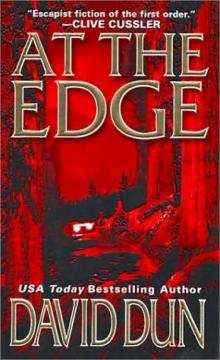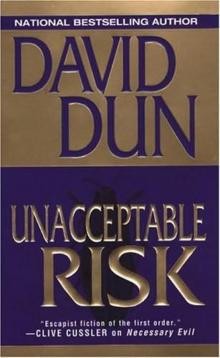Overfall Read online
Page 11
Sam walked back to a wooden bench overlooking the bowl-shaped harbor where they would wait for the seaplane. Large conifer trees, lustrous and green, covered the upper slopes around the bay. The water was calm; the hillsides near the water were very rocky and produced gnarled trees in interesting shapes and arrangements; the ground was ornamented with salal, grasses, and fern, the rocks with lichen. Broken clouds let the sun stream through, bringing out the blue of the sky and sea. Something about the place was more than the sum of its parts, creating a mood unique in its intrigue.
“It’s beautiful here.” Anna had found him.
“Yes.”
“Why do I smell cigarettes?”
“Maybe the shirt.”
“Sam, could we talk seriously a minute?”
“I’m always serious. It’s just that I occasionally feel compelled to be irreverent.”
“Tell me about your mom and dad.”
“Just like that?”
“Come on, Sam, you’ve given me nothing else, and you know you can trust me.”
“Well, the only thing I knew about my mom when I was growing up was what my dad told me.”
“Which was?”
“Drunken slut.”
“That’s it?”
“That’s all of it.”
“Did you ever see her or talk to anyone who knew her?”
“Not when I was growing up. I knew only my grandparents on my dad’s side and never my mom’s. My grandparents just refused to mention her or comment in any way. It wasn’t until a few months after my dad died that I discovered my mother. I was eighteen and in college. At first I told myself I wanted to meet her or find her grave. Listening to my dad, I guess I had it in my head that she probably died of alcohol or drugs. I traced my dad’s life back to when he was nineteen, found people who knew him then, people he’d lost all contact with. They told me about a beautiful girl, Native American, that he dated. I discovered the schools she might have gone to and started looking. Finally, I got a name, pictures, positive ID, and found her. I think I just didn’t want to doubt my dad when he was alive so I hadn’t pushed it.”
“I want to be sensitive here. But there is this sort of looming question—”
“Why didn’t my mother find me? Why did she let me go?”
“Well, yes.”
“She was going to school, he was working. They actually met because my mother was renting a room in my grandparents’ basement. They lived not far from the school campus. All of my mother’s family at that time was pretty much centered in the reservation. Neither my mother nor my father wanted me on the reservation, so his parents took care of me during the day and my mom took care of me at night. My mom and dad were never married and my mom just kept on living with my grandparents and going to school. My dad lived on a military base. Not long after I was born my parents quit talking. Then, when I was a year and a half old, my mom went on a travel class overseas for a month.
“When she returned, my father and grandparents told her I had died the day she left. Crib death, they said. Showed her an urn with my ashes. She totally believed it, and it really broke her down. She went back to the reservation, then on to the city and problems with drugs and alcohol, then back to the reservation and a dry-out facility. Then she spent time with her father and really changed. She went back to school, graduated. She is a psychologist and a spiritual leader in the tribe. When I found her and she saw me, she suspected who I was during my fumbling introduction. I mentioned my father and she started weeping.”
“She must have felt horribly betrayed.”
“It was hard for her to get over the hate.”
“I can imagine. Your dad raised you?”
“I lived mostly with his parents until I was ten; then he took me full-time.”
“And when you learned the truth you felt betrayed?”
“Horribly. But you deal with it.”
“Did you and your dad get along?”
“My dad taught me three things—self-reliance, self-control, and survival. He was special forces military.” Sam just smiled.
“Oh, I get it. It might give you away.”
“My dad did that until age thirty-seven, when he faked an accident so he could die so he wouldn’t have to retire and become an ambulance driver or something like that. He’d had knee troubles and his brand of special forces didn’t go much past forty anyway.”
“He killed himself?”
“Not what they called it, but that’s what he did.”
“I’m sorry.”
“When I was growing up, he put me through a tougher version of what he went through. We went on trips into the Alaskan wilderness, British Columbia, practically naked, and lived like animals. We climbed around on Mount Denali, scaled ice cliffs. He loved to tell me about all the schools he went to. There were at least nine. Combat diving, paratrooper, underwater egress, survival, special ops medicine. He knew I was more suited to academic school, using my mind. I think he was trying to sweat it out of me.”
“You never wanted to follow in his footsteps?”
“I never for a second considered the military.”
“You just don’t seem like a math nerd.”
“Well, Dad made sure I was big and strong and athletic. I got out a lot and—”
The drone of the seaplane provided a convenient escape from what was quickly becoming an embarrassing topic.
“Sam?”
“Yeah.”
“Did your father abuse you?”
“He didn’t hit me except with boxing gloves on. But he did things with a young kid that shouldn’t be done.”
“Like?”
“Like it’s time to go.”
“Sam ...”
“I loved him. I respected him. But at the same time I pretty much lost him even before he died.”
“What do you mean?”
“In the winter I studied and played with my computer, primitive as it was in those days. I got totally enthralled with math and then computers and from about twelve on it was all I thought about. Any fun I had on the wilderness forays in the summer was blunted because it kept me from playing with computers. I was great with logic and math but not much else in school. I’m dyslexic and couldn’t read a book to save me. The math skills got me pretty far, though. The high schools didn’t pay a whole lot of attention to other subjects as far as I could tell. So I went off to the university young.”
“What university?”
“A good one. Doesn’t matter. Graduated at twenty and after that got some graduate degrees. Was out at twenty-four.”
“What graduate degrees?”
Sam smiled. “You’re narrowing it down.”
“Don’t be a jerk. You’ve told me this much. Now give.”
“Computer science. Tech stuff. Ph.D.”
“So you were at school a lot.”
“Yeah, from about twelve on I was the boy wonder. The real key was this professor I had. He took me under his wing. He’s the reason I did well in college. He figured out a way for me to read like a normal person, and after that I read fanatically.”
“And your son?”
Sam hesitated. “My son was killed. We were on a job. It was my fault.”
“What happened?”
“I’d rather not go into it now. Maybe another time.”
She waited a few seconds, looking for the plane. “Okay.”
Ten
In six hours Anna was out of Vancouver and on her way to New York.
After seeing her off in the studio’s Gulfstream IV, Sam climbed into a Hawker 700 for the trip to LA. The Hawker was an old workhorse business jet, worth maybe one-fifth as much as the plane that came for Anna. It was owned by Sam’s friend, who let him use it for a fee. Sam was a no-frills guy even when it came to his choice of jets.
At Sam’s request the pilots had been good enough to obtain some tobacco leaves and a humidor that originally came from a Cuban national who for years had supplied Sam.
Inside the jet things were posh and comfortable. The plane’s sidewalls were wood and, near the floor, carpet. On the ceiling and upper sidewalls it was two-tone, stitched leather. Sam settled into a seat with Atlas-sized armrests and watched the flight information display monitor for a couple of minutes before he cracked open his small tobacco box.
He could understand his friend’s wife not wanting their plane to smell like a cigar, even a good cigar, but there was no law against rolling one. Sam took a large unblemished tobacco leaf and rolled the smaller leaves and pieces inside it to make a loose facsimile of a real cigar. When he had it all carefully rolled, he stuffed it in a cigar tube and screwed on the lid. Sometime this week he would smoke it.
He picked up the sat phone built into the plane and called Paul.
“Hi,” Sam began.
“Well, well, well, you’re coming back to work. I heard you’ve got Jill back in the saddle. And Shohei called me.”
“It’s a particular assignment.”
“Hey, you know me. I’m in.”
Sam spent a solid forty minutes telling Paul the whole story.
“This could only happen to Sam the History Man,” Paul said when he was through asking questions. “Now let me get this straight. You’re telling me that Anna Wade doesn’t even know the rules?”
“No contract yet. I told her not to talk. She’s not fooling me. I figure she’ll go ask around about me. She’s a control freak.”
“From what you’ve told me she also has no sponsor.”
“We’ll fix that. Let’s see what she does.”
“From what you gleaned it sounds like she’s most likely to spill the beans to her ex or her boyfriend. We gonna need somebody in New York?”
“Oh, yeah. For protection, mainly, but also to keep the lid on any snooper stuff. Let’s impress her. We’ll find out a lot in the first few hours.”
They talked over the details of what they would need to do in the next twenty-four hours. It was a long list.
“Have Farris get the ESN number and the phone number on Anna’s cell. They’ve got the contacts, probably cost a few grand.”
“Use an oscillator?”
“Yeah. Record every word.”
“You’re gonna feel like a shit.”
“I know. Do you think I should call Typhony?” Sam asked, now satisfied that Paul understood.
“She’s one of the best researchers we ever had. She can make Big Brain sing songs and tell secrets. You already got one ex-lover back in the biz, why not two?”
“You think her boyfriend will be all right with it?” Sam said.
“Fiancé, you mean. Yeah, I do. He’s a good guy.”
“There’s an undertone there.”
“No undertone. I just never figured out why you and she didn’t stay connected.”
“One of those mysteries.”
“Truth’s truth, Sam. Commitment bores you. That was Jill and that was Typhony. So you gonna call Typhony or am I?”
“She’s got another job, doesn’t she?”
“Sam, she’ll be crushed if you don’t even call and ask. She’s an executive assistant for some stuffed shirt. And you never know what she’ll do till you ask.”
“But for one assignment?”
“Hey, nobody believes that retirement crap. You want me to call?”
“I’ll call.” Sam now knew exactly how Paul’s conversation with Typhony had gone. But it was necessary to play it out. It might be as long as twenty-four hours before she was back in the office.
Sam’s finger was poised over the button. Once he dialed there was no turning back. The choice was still his until he dialed the number. It was about as awkward as a man finding his sister making love to his wife, but other than that the call was a breeze. After Typhony finished the verbal torture, Sam got down to the big question, and after appropriate hesitation and more than the usual verbal sparring she took the job.
“Talk to Paul, of course,” Sam told her, “and get the full story from him. But do a complete search on Dr. Kenneth Galbraith, psychiatrist. Where he went to school, all the doctors in his class; any publications; every mention of him in the press; credit check; all the usual. And start having someone go through his garbage immediately. No doubt he’ll have a cell. Figure it out, get the ESN, the whole nine yards, and get one of our contract guys listening to his calls. If we get anything at all we’ll arrange more groundwork. If he lives remotely, use the drone, get blowups; otherwise drive-bys are okay. Then in the morning begin interviews immediately. Use Royce and associates. When you’ve got Royce going, help Paul on Grace Technologies: one Roberto Fresco, its vice president; DuShane Chellis, the president. I forgot to mention to Paul I think we should call our friends in Brussels and have them work on the France end. I’d like that outfit Discretion.”
“I don’t know how you end up with the most famous and the most troubled,” she said. “But that’s okay,” she added before he could respond. “We knew you’d come back, and I guess Anna Wade is as good an excuse as any.”
Devan Gaudet was looking forward to seeing the offices of Grace Technologies without its master ushering him around. Although he had been in the building a number of times as the need for his services increased, his movements were always controlled. Headquarters stood on the Rue de l’Arrivée, a block from the Luxembourg Gardens, where Chellis reportedly paced when in the throes of a deal.
For a Paris office, Grace’s was expensive, which meant that by the standards of most of the world’s cities it was exorbitant. Devan Gaudet looked up at the building from the small entry plaza just outside the main doors. Even he had to admit that Chellis had come a long way from Omaha, Nebraska. But the man still had the petty mind of an American.
The main doors led to a spacious atrium and waiting area that looked like a men’s luncheon club. Large windows, painfully tasteful brown leather, and subdued plaids on the furnishings made one think of cigars and chess. According to Benoit, people congregated here to talk sometimes about business and usually when Chellis was out of the office. This was the policy center of the holding company, where business strategy at the highest levels took place.
Chellis’s personal offices were through a second set of double doors off the atrium and down a long hall lined with other offices, making the path to his suite a little like an obstacle course for unwanted visitors. Chellis did not care for confrontation unless he had arranged for one of his rages, and then he sought it.
Gaudet used a pass provided by Benoit. He had arrived early deliberately; he wanted to get the feel of the place. Benoit had explained the sorts who hung out at the main office and she certainly had it pegged. Largely the working technical fellows would be found at the company’s regional centers. Here scientists who no longer did science came to spend their last few years with the businessmen and MBAs and occasionally with the boss himself.
Gaudet made his way into the inner office without drawing a glance; he tried out Chellis’s chair and used his phone for fifteen minutes before Chellis and Benoit arrived, fresh from the flight in from Kuching. He heard Chellis well before he saw him.
“So they can screw themselves and go straight to hell and I want you to tell them that,” he said. When he walked in the door he was pocketing a cell phone.
“Soon it will be time for your brunch,” Benoit said as she put her purse down on Chellis’s table. It irritated Gaudet that she occupied the man’s space so casually.
“Why hasn’t Roberto called back? What in the hell are they doing? Do I have to wipe his ass?”
At that moment they both saw Gaudet standing behind the desk.
Without smiling or offering a greeting, Gaudet walked to the sitting area toward the front of the office. He knew that when his clients needed him they had no alternative, so unlike in most personal service businesses the niceties could be ignored. When they were seated, each with a cup of coffee, Gaudet looked longer at Benoit than at Chellis.
“Your mistress is very beautiful. Li
ke your wife.”
“She is my assistant.”
“Tell me the problem, then. But be more truthful about the problem than you are about your love life.”
“You show respect or we have no deal.”
“Relax. She is not ashamed of you. Why are you ashamed of her?”
“Get out.”
Gaudet rose to leave.
“Wait. Just wait,” Benoit said. “DuShane is not ashamed of me. He is protecting someone I love. Marie, his wife, is my sister. There is no disrespect. So why can’t we all sit down and do our business?”
Gaudet hesitated.
“Sit down. I have always paid you. That should mean something,” Chellis said. “We know you are the best. There are others, but everyone tells me none as good as Gaudet.”
Gaudet sat. “As I said before, I no longer work merely for cash.”
“I’d heard. What do you want?”
“A piece of something. Part of a venture. I think you need me in the arms part of your business. Ten percent. I want ten percent You’ve been holding out on me.”
“That’s ridiculous.”
“Is it? Think of the future. In that line of business you may need a scapegoat who can disappear into thin air. Think of the advantages.”
The men wrangled for fifteen minutes over their egos and their money.
“Five percent,” Chellis finally said. “And that is asinine. You didn’t build this business.”
“I’m about to save your skin.”
“And you have to take care of things without additional fees since you’d be a partner.”
“Five percent will do, but I get full audit privileges. My people look at anything and everything any time they want. And of course I will still receive basic cash fees in addition.”
“You’re not being rational.”
“To the contrary. The business of killing people is a precise science. You clearly need someone dead. Take it or leave it.”
“My attorneys will make a draft of the assignment documents.”
“My attorneys will make the first draft after conferring with your lawyers on the subject of the involved entities.”

 Overfall sw-1
Overfall sw-1 Unacceptable Risk
Unacceptable Risk At The Edge
At The Edge Unacceptable Risk sw-2
Unacceptable Risk sw-2 Overfall
Overfall The Black Silent
The Black Silent